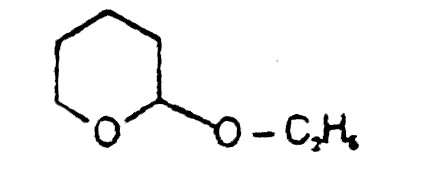Select the compound in which HCl is not the product of Hydrolysis:
NCl3
PCl3
AsCl3
BiCl3
The correct Answer is:A
To solve the question of which compound does not produce HCl upon hydrolysis, we will analyze the hydrolysis reactions of the given compounds step by step.
Step 1: Analyze the first compound, NCl3 (Nitrogen trichloride)
- When NCl3 reacts with water (H2O), the reaction is as follows:
NCl3+3H2O→NH3+3HOCl
- In this reaction, we produce NH3 (ammonia) and HOCl (hypochlorous acid), but no HCl is formed.
Step 2: Analyze the second compound, PCl3 (Phosphorus trichloride)
- The hydrolysis of PCl3 can be written as:
PCl3+3H2O→H3PO3+3HCl
- Here, we produce H3PO3 (phosphorous acid) and 3 moles of HCl.
Step 3: Analyze the third compound, AsCl3 (Arsenic trichloride)
- The hydrolysis reaction for AsCl3 is:
AsCl3+3H2O→H3AsO3+3HCl
- This reaction also produces H3AsO3 (arsenic acid) and 3 moles of HCl.
Step 4: Analyze the fourth compound, BiCl3 (Bismuth trichloride)
- The hydrolysis of BiCl3 can be expressed as:
BiCl3+H2O→BiOCl+2HCl
- In this case, we produce BiOCl (bismuth oxychloride) and 2 moles of HCl.
Conclusion
From the analysis of all four compounds, we can conclude that:
- NCl3 does not produce HCl upon hydrolysis, while PCl3, AsCl3, and BiCl3 do produce HCl.
Thus, the compound in which HCl is not the product of hydrolysis is NCl3.
- When NCl3 reacts with water (H2O), the reaction is as follows:
NCl3+3H2O→NH3+3HOCl
- In this reaction, we produce NH3 (ammonia) and HOCl (hypochlorous acid), but no HCl is formed.
- The hydrolysis of PCl3 can be written as:
PCl3+3H2O→H3PO3+3HCl
- Here, we produce H3PO3 (phosphorous acid) and 3 moles of HCl.
- The hydrolysis reaction for AsCl3 is:
AsCl3+3H2O→H3AsO3+3HCl
- This reaction also produces H3AsO3 (arsenic acid) and 3 moles of HCl.
- The hydrolysis of BiCl3 can be expressed as:
BiCl3+H2O→BiOCl+2HCl
- In this case, we produce BiOCl (bismuth oxychloride) and 2 moles of HCl.
From the analysis of all four compounds, we can conclude that:
- NCl3 does not produce HCl upon hydrolysis, while PCl3, AsCl3, and BiCl3 do produce HCl.
Topper's Solved these Questions
- TYPES OF REACTIONSBOOK - VK JAISWAL ENGLISHCHAPTER - TYPES OF REACTIONSEXERCISE - LEVEL 3
44 Videos
- TYPES OF REACTIONSBOOK - VK JAISWAL ENGLISHCHAPTER - TYPES OF REACTIONSEXERCISE - ONE OR MORE ANSWERS IS/ARE CORRECT
40 Videos
- TYPES OF REACTIONSBOOK - VK JAISWAL ENGLISHCHAPTER - TYPES OF REACTIONSEXERCISE - SUBJECTIVE PROBLEMS
42 Videos
- s-BLOCK ELEMENTSBOOK - VK JAISWAL ENGLISHCHAPTER - s-BLOCK ELEMENTSEXERCISE - SUBJECTIVE PROBLEMS
2 Videos
Similar Questions
Knowledge Check
White phosphorus reacts with chlorine and the product hydrolyses in the presence of water. Calcualte the mass of HCl obtained by the hydrolysis of the product formed by the reaction of 62 g of white phosphorus with chlorine in the presence of water.
A200 gB400 gC219 gD100 g
End products of protein hydrolysis are
View SolutionWhite phosphorus reacts with chlorine and the product hydrolyses in the presence of water. Calcualte the mass of HCl obtained by the hydrolysis of the product formed by the reaction of 62 g of white phosphorus with chlorine in the presence of water.
View SolutionSelect the correct answer from the choice given in brackets :
The functional group of the product formed - on hydrolysis of bromoethane with aqueous caustic potash. [alcohol, carboxylic, hydroxyl, aldehydic]
View SolutionWhat are the products of hydrolysis of maltose?
View SolutionWhat are the products of hydrolysis of lactose?
View SolutionWhich of following gives only basic product on hydrolysis :-
View SolutionWhat are the products of hydrolysis of lactose ?
View Solution

